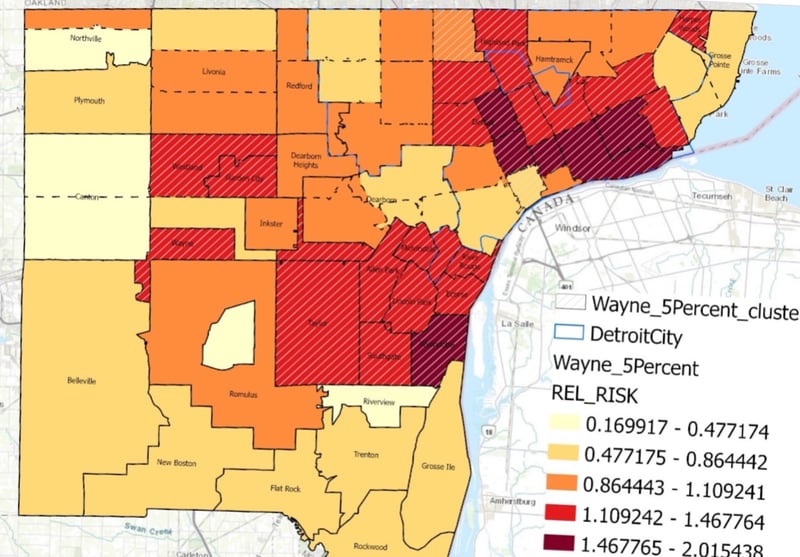Get Healthy!

- Alan Mozes
- Posted May 9, 2023
Dirty Air & Lung Cancer: Detroit Study Shows How Your Neighborhood Matters
Does where you live affect your risk for lung cancer? Just possibly, experts warn.
Although cigarette smoking is the principal cause of most lung cancers, new research has found evidence that Americans who live in areas where air quality is poor may be at greater risk for the most common cancer killer in the United States.
The finding is based on mapping that zeroed in on Detroit and surrounding Wayne County, Michigan, to see how lung cancer incidence over nearly 40 years stacked up against air quality in different areas.
"The main takeaway is that there is a relationship between incidence of lung cancer and specific environmental pollutants,"said lead author Dr. Hollis Hutchings, a thoracic surgery research resident at Detroit's Henry Ford Health.
Hutchings and her team reviewed data gathered between 1985 and 2018 by the Michigan Cancer Registry.
Over that period, nearly 59,000 new cases of lung cancer were diagnosed in Wayne County. Thirty-seven percent of patients identified as members of a racial minority (average age, 67.8 years).
The air pollution status of different areas of the county was then gleaned from U.S. Environmental Protection Agency (EPA) data collected between 1980 and 2018.
On the positive side, most markers of air pollution (though not all) across Wayne County did improve over that time.
But the three areas with the highest rates of lung cancer over time also had the highest levels of certain air pollutants. Those pollutants were sulfur dioxide (SO2), particulate matter 10, nitric oxide and volatile organic compounds (VOCs).
The researchers found three major clusters of lung cancer in the county, located in areas with high SO2 levels. Those areas included downtown Detroit and the city's "downriver" industrial area.
The third cluster -- in Detroit's western suburbs -- was deemed less significant in terms of key pollutant levels.
Hutchings noted that the two most significant links between lung cancer risk and pollutants involved SO2 and VOCs.
In particular, VOCs "were significantly related to incidence of lung cancer throughout the study period,"she said.
Just how much exposure to polluted air is needed to boost lung cancer risk is a question Hutchings and her team are still investigating. They also plan to investigate how long it takes for exposure to pollution to cause lung disease.
But Hutchings said this study and others make clear that "environmental air pollutants are certainly an important contributor with regards to lung cancer risk, especially in never-smoker patients."
That thought was seconded by Dr. Amit Mahajan, a volunteer medical spokesman with the American Lung Association.
"Smoking is the No. 1 cause of lung cancer, but small particles found in air pollution can also increase the risk of lung cancer,"said Mahajan, medical director of the interventional pulmonology and complex airway disease program for the Inova Health System in Fairfax, Va.
He noted that while studies from Europe and Asia previously identified the cancer risks associated with air pollution, the new study drives the point home, by linking specific highly polluted communities with a spike in lung cancer rates.
Still, Mahajan said, many questions remain, given the many overlapping factors that can contribute to lung cancer risk, including air quality, genetics and smoking history.
Meanwhile, minimizing exposure to those factors that can be controlled is key, he said. And, in that regard, avoiding cigarettes is the No. 1 target.
"While we cannot choose our genetics, or where we necessarily live, we can choose to reduce our risk of lung cancer by not smoking,"Mahajan said.
Hutchings and her colleagues presented their findings Saturday in Los Angeles at a meeting of the American Association for Thoracic Surgery. Research presented at meetings should be considered preliminary until published in a peer-reviewed journal.
More information
There's more about the link between air pollution and lung cancer at the American Lung Association.
SOURCES: Hollis Hutchings, MD, thoracic surgery research resident physician, Henry Ford Health, Detroit; Amit Mahajan, MD, volunteer medical spokesman, American Lung Association; presentation, American Association for Thoracic Surgery meeting, May 6, 2023, Los Angeles



